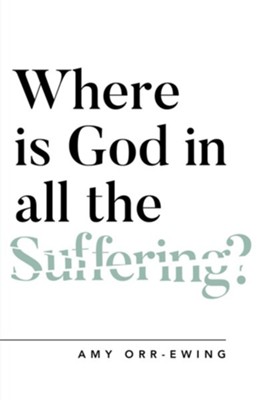- Ven. John Hassan
- December 4, 2020
- 0 Comments

Dr. Amy Orr-Ewing is no stranger to pain. She gives a heartfelt yet academically rigorous examination of how different beliefs deal with the problem of pain, showing that Jesus alone gives hope.
As I write this, my dear friend Brenda has just died. She was 36 and leaves a husband and three children, the youngest of whom is a five-month-old baby.
A few days ago I walked behind her casket into her funeral service, carrying her baby girl in my arms. I find myself asking: Is there any hope in this seemingly hopeless situation? Is there any comfort for a daughter who will grow up not remembering her mother? Is there a loving God who could pour his love and comfort into our grieving hearts? Is God really there in all our pain and heartache over loss?
Right now I find myself working at home during a government lockdown, in isolation with my family. The death toll from COVID-19 climbs daily. We have all been shocked to discover how vulnerable and helpless we are against a microbial virus that has taken loved ones, closed borders, shops and restaurants, and halted the economy of half the planet. Where is God in the fear, suffering, and grief of this global pandemic?
Books on suffering written by academic types rarely connect with people who are actually suffering. I work in Oxford, and I have had the opportunity of studying and teaching throughout my adult working life. In the course of that time, I have found myself drawn to thinking about and reflecting on some of the toughest questions of life. Through all of that, I have come to realise that if Christian faith is worth considering, it needs to be deep enough to cope with our most rigorous human scrutiny and our most heart-rending questions.
One of the worst things people in religious circles sometimes seem to say to someone suffering is “Don’t ask why,” closely accompanied by “Don’t think about it” or “Just have faith.” These comments are just so unhelpful.
A questioning and thoughtful response to our human experience of suffering can be a really important part of coming to terms with terrible things that have happened to us. But I want to suggest that it can also be a crucial part of exploring the Christian faith. The Bible is full of people’s questions to and about God in the context of human suffering. Questions like Why would you let this happen?and Where are you, God?
Where I am coming from
Am I an ivory-tower academic coming at this question as a puzzle to be solved?
No…
My own personal experience has graphically coloured this question of suffering for me. Although I am a writer, a thinker, and a teacher, I have spent 14 years of my life living in deprived neighbourhoods—in the inner city. I lived for seven years at a time in two of Britain’s most disadvantaged and dangerous neighbourhoods. As a teenage girl I was physically attacked, but, perhaps more significantly, in my early thirties I lived under the specific threat of violent attack (rape and murder) for two years.
Personal experience inevitably shapes our thoughts about the question of suffering and evil, and we all need to be honest about that. For me this question is profoundly personal; it is not primarily abstract or theoretical. How do we make sense of the suffering in the world around us when it feels like this?











